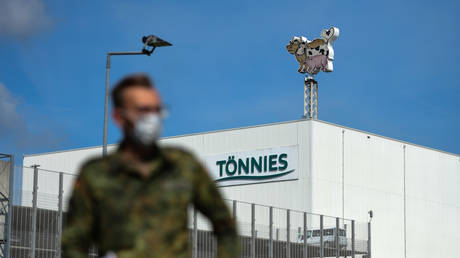
Strict lockdown restrictions have been reimposed in the German district of Guetersloh after more than 1500 slaughterhouse employees tested positive for the Covid-19 virus in the last week alone.
North Rhine-Westphalia’s state premier Armin Laschet announced on Tuesday that museums, theaters, bars, and gyms will close again, just a month after they were allowed to reopen. The fresh restrictions will be in place until June 30.
In addition to the wider lockdown measures affecting about 360,000 people, 7,000 employees at the Toennies factory will be under mandatory quarantine.
The state government also ordered police deployments to the region to better manage the quarantine.
“The new regulations are comparable to what we saw [across the country] in March,” state premier Laschet said, adding that approximately 100,000 residents of the Guetersloh region can be tested for free for coronavirus.
If the numbers of infected people outside the factory remain low, the measures could soon be relaxed once again, but authorities said there is also the possibility that the lockdown could be extended. So far, only 24 people in the district with no connection to the plant have tested positive.
This marks the first local lockdown in Europe since the easing of restrictions in May. Laschet said the Guetersloh outbreak was the “largest occurrence of infection” within Germany. The Toennies outbreak and other recent local outbreaks of the infections have pushed the country’s coronavirus R-value (reproduction rate) up to 2.76 on Tuesday from just 1.06 on Friday.
While European countries have begun to ease their lockdowns, close observation is being paid to the reproduction rate, which estimates the number of secondary infections passed on from one person and can serve as an indication of a potential second wave of the virus on the horizon. The virus is considered efficiently contained if the rate is less than one.
Like this story? Share it with a friend!




